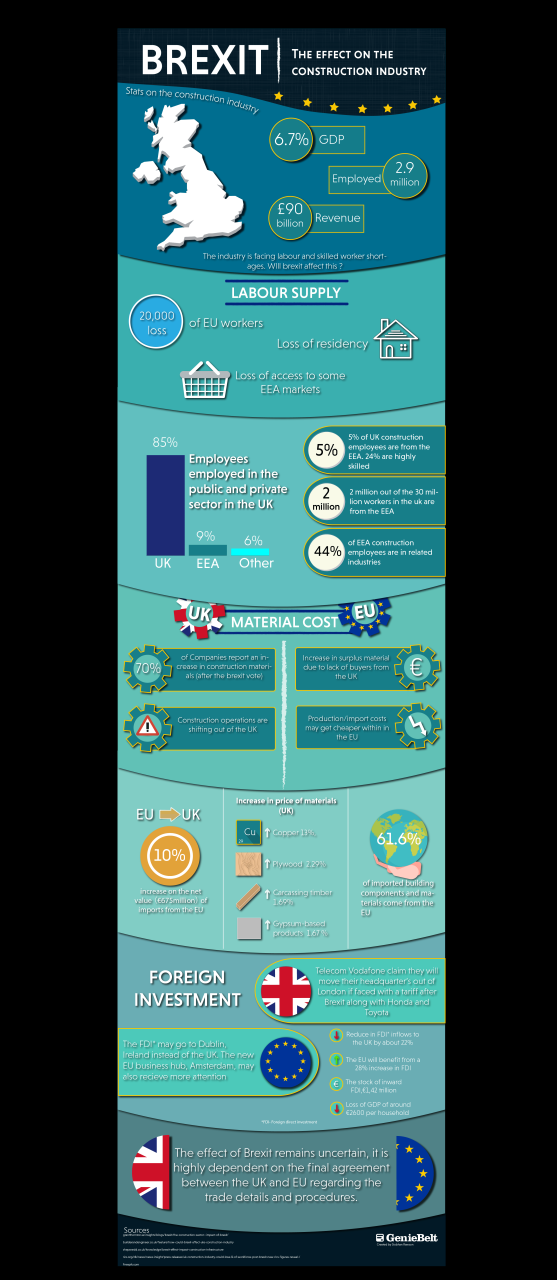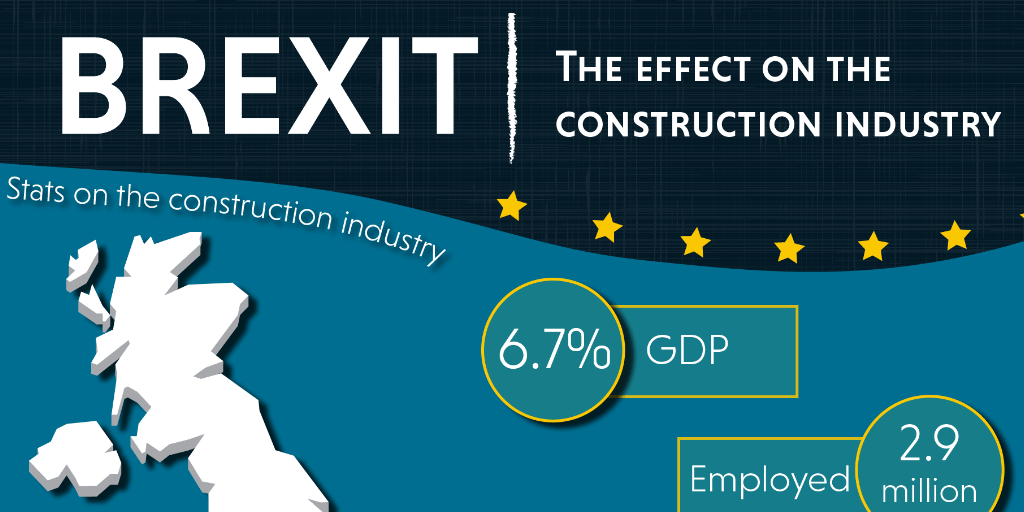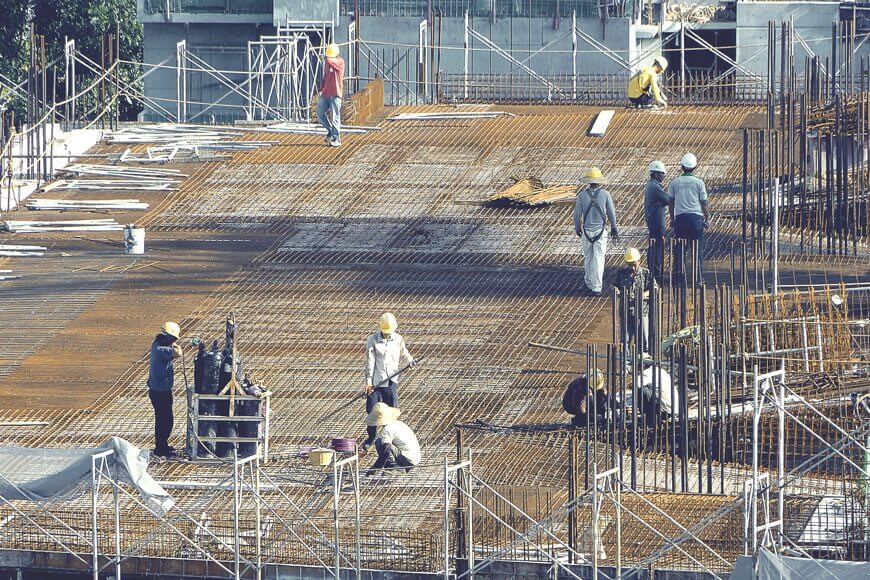
[clickToTweet tweet=”Take a look at this great infographic about the impact of #Brexit on the #construction industry ?️” quote=”Take a look at this great infographic about the impact of #Brexit on the #construction industry ?️”]
The UK remains uncertain of the full impact the EU referendum will have and how Brexit will actually affect the construction industry. There are many hypotheses surrounding the future of the UK, but taking a look at the big picture and how Brexit will affect the construction industry can provide some insight into what the industry may come up against, post Brexit.
On 29th July 2016 following the decision that the UK would leave the EU, The Royal Incorporation of Architects in Scotland (RIAS), Royal Institute of Architects in Ireland (RIAI), The Royal Institute of Architects (RIBA), Royal Society of Architects in Wales (RSAW) and Royal Society of Ulster Architects (RSUA) made statements requesting that the free movement of people, goods and services throughout Europe be protected due to their vital importance to the economic, social and environmental well-being of the Islands.
Many businesses within the construction industry employ EU labour because it is cheaper. Cheaper labour results in better project margins and allows businesses to tender for work that they would otherwise not be able to. If the labour force becomes more expensive this has a direct result on project margins, reduces the competition between projects and prevents some businesses from tendering altogether because they cannot earn enough to sustain the project.
It can be argued that this could also have a more positive outlook on the UK’s labour market as more jobs can be created for UK citizens, but in reality, if project margins are to be squeezed further, this could result in the existing workforce having their workload increased instead of growing the workforce and spreading the work.
As a member of the EU, the UK had access to the European Investment Bank (EIB) and the European Investment Fund (EIF). Together these institutions invest in major infrastructure projects and the UK losing both of these revenue streams could have a significant impact on the delivery of large infrastructure projects, as well as start-ups across the UK.
Although this loss in revenue could potentially be replaced by the savings from an EU membership, it is also unlikely with current ongoing government cuts, that this saving would be spent on infrastructure.
The loss could also affect the number of workers available for housing projects and the ability to meet the government’s housing targets. Combine this with cost increases for the housing market and individual construction companies, and this could create further decline in sales for the housing market and for housebuilding.
Find Here: Modernise Or Die: The Need For Change In Construction
On the other hand if larger organisations and cooperations start moving funds from the UK to foreign property markets, this could potentially reduce prices and grant access to disused land and derelict properties that have built valuable land banks and equity acquisitions for larger organisations.
The President of the Royal Institute of British Architects (RIBA) Jane Duncan was optimistic in her statement saying “I would like to add that the UK Infrastructure is a resilient, flexible and innovative profession with a long and proud history. I’m confident that architects, along with our partners in the wider creative and construction industries, can help deliver strong economic growth for the UK during and after Brexit. As we look outwards to the world, we will continue our work with the UK government to address the challenges and support the opportunities that arise from Brexit, including pressing for continued free movement so vital for architects’ practices in the UK and the EU, and mutual recognition of qualifications.”
In addition to the free movement request from RIAS, RIAI, RIBA, RSAW and the RSUA, membership of the EU also allowed for the movement of materials through open borders, duty and restriction free, within the EU. This was a huge benefit to the construction industry. A study conducted in 2010 by the Department of Business Skills and Innovation estimated that more than half of building materials were imported from the EU. Post Brexit, importers and exporters may face duties and limitations on goods which could lead to a limited availability of construction materials or heavier costs. It is possible within the UK for government to encourage or even demand the use of only UK firms and materials, in support of UK based enterprises.
Read Also: UK Construction Restrictions: The Struggle For Momentum
The Federation of Small Businesses states that SME’s employ 60% of the UK private sector employees, with 76% of all SME’s employing no one but the owner. SME’s are said to be the backbone of the UK economy. What captures the interest further is that
18% of SME’s operate within the construction industry, this being the largest representative industry or sector with professional services coming in second at 15%.
Without the use of EU funding, the UK is going to have to find creative ways of attracting investment. The UK needs to attract new sources of money, and circulate its own money in order to stimulate development. Therefore, the need to find non- traditional funding sources is already important, but further down the process, will become greater. This is another risk for the UK with no clear-cut answers.
Without new sources of funding, the UK is at risk of being an unattractive investment. This can have a profound effect on growth, particularly in the construction and engineering sectors which often require large budgets and years of forecasting and planning in order to deliver large developments. As a result many companies have put large scale projects on hold and are re-balancing projects in their delivery phase to account for the uncertain future. Other large scale projects are being divided into manageable phases, which although risky and more expensive, can make more sense in the long run.
It is not yet known whether the UK will be able to negotiate its own terms of trade within the EU and other major importers, such as China and the USA, or whether the UK government will have to impose tariffs on cheap materials imported from the UK. A negotiation and development of its own terms of trade would obviously be preferred as the latter creates the potential risk of retaliation from affected countries.
General opinion seems to state that Brexit could result in the removal of the confining restrictions and limitation currently mandated by the EU, but Brexit will not result in damaging all bonds between the UK and the EU. Agreements for importers and exporters will still be decided upon which would hold the expectation that the UK complies with existing agreements set by the EU.
Many large organisations have offices in other European countries, but for the smaller companies, guaranteed access to the EU can only be cemented with an office or hub within Europe. Many are already starting this process with Ireland being one of the main benefactors through the long-term relationship between the UK and Ireland.
With a more positive eye, the UK has strengths to sell. The UK government and professional associations have to find a way to market themselves to the outside world again. In the wake of the Brexit vote, the Mayor of London launched the “Londonisopen” campaign, a creative and fun opportunity to show off London’s skills but with a serious underline agenda. More creative opportunities will be generated with marketing and communication professionals taking the forefront and SME’s finding unique and innovative ways to market themselves in and outside of Europe.
[clickToTweet tweet=”Check out this great infographic about the effects of #Brexit on the #construction industry ?️” quote=”Check out this great infographic about the effects of #Brexit on the #construction industry ?️”]
Brexit will undoubtedly create ripples and reshape the foundations of the construction industry. All good planners have an all-round understanding of their projects, including all the risks involved. They must be aware of the worst case scenarios, have a plan to avoid it and a plan to re-balance the project should the worst case scenario become a reality. The UK government is now working on a plan. We can only hope their planners are as thorough as the planners within the construction industry.
Infographic designed by: Siobhan Rawson
Text Written by: Eve Sangster, Icorrus.com
[body]




